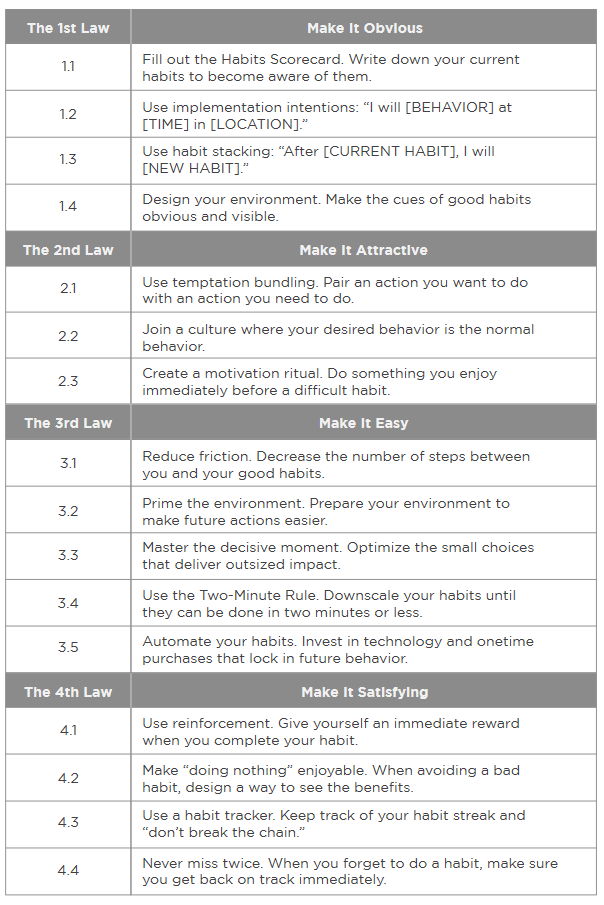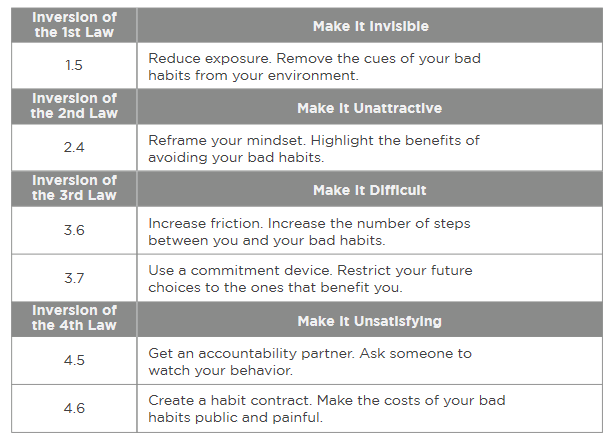| |
|
Atomic Habits are a series of small practices which if applied in the medium/long term can help us to achieve remarkable results (small changes adds up together creating a growth mindset). One of the main reason why we might be tempted to form bad habits instead of good habits is not in general because of a luck of motivation but because we tend to focus on goals rather then building systems.
Takeaway Points
Creating good habits

Figure 1: James Clear CheatSheets
Breaking bad habits

Figure 2: James Clear CheatSheets
Quotes
“Changes that seem small and unimportant at first will compound into remarkable results if you’re willing to stick with them for years. We all deal with setbacks but in the long run, the quality of our lives often depends on the quality of our habits. With the same habits, you’ll end up with the same results. But with better habits, anything is possible.”
“Success is the product of daily habits—not once-in-a-lifetime transformations.”
“It doesn’t matter how successful or unsuccessful you are right now. What matters is whether your habits are putting you on the path toward success. You should be far more concerned with your current trajectory than with your current results. Your outcomes are a lagging measure of your habits. Your net worth is a lagging measure of your financial habits. Your weight is a lagging measure of your eating habits. Your knowledge is a lagging measure of your learning habits. You get what you repeat.”
“Time magnifies the margin between success and failure. It will multiply whatever you feed it. Good habits make time your ally. Bad habits make time your enemy.”
“Goals are about the results you want to achieve. Systems are about the processes that lead to those results. Achieving a goal only changes your life for the moment. That’s the counterintuitive thing about improvement. We think we need to change our results, but the results are not the problem. What we really need to change are the systems that cause those results. When you solve problems at the results level, you only solve them temporarily. In order to improve for good, you need to solve problems at the systems level. Fix the inputs and the outputs will fix themselves.”
“The implicit assumption behind any goal is this: “Once I reach my goal, then I’ll be happy.” The problem with a goals-first mentality is that you’re continually putting happiness off until the next milestone. A systems-first mentality provides the antidote. When you fall in love with the process rather than the product, you don’t have to wait to give yourself permission to be happy. You can be satisfied anytime your system is running. And a system can be successful in many different forms, not just the one you first envision. When all of your hard work is focused on a particular goal, what is left to push you forward after you achieve it? This is why many people find themselves reverting to their old habits after accomplishing a goal. The purpose of setting goals is to win the game. The purpose of building systems is to continue playing the game. True long-term thinking is goal-less thinking. It’s not about any single accomplishment. It is about the cycle of endless refinement and continuous improvement. Ultimately, it is your commitment to the process that will determine your progress.”
“Many people begin the process of changing their habits by focusing on what they want to achieve. This leads us to outcome-based habits. The alternative is to build identity-based habits. With this approach, we start by focusing on who we wish to become. The concept of identity-based habits is our first introduction to another key theme in this book: feedback loops. Your habits shape your identity, and your identity shapes your habits. It’s a two-way street. The formation of all habits is a feedback loop, but it’s important to let your values, principles, and identity drive the loop rather than your results. The focus should always be on becoming that type of person, not getting a particular outcome.”
“Your culture sets your expectation for what is “normal.” Surround yourself with people who have the habits you want to have yourself. You’ll rise together.”
“The Goldilocks Rule states that humans experience peak motivation when working on tasks that are right on the edge of their current abilities. Not too hard. Not too easy. Just right.”
“The upside of habits is that we can do things without thinking. The downside of habits is that you get used to doing things a certain way and stop paying attention to little errors. You assume you’re getting better because you’re gaining experience. In reality, you are merely reinforcing your current habits—not improving them. In fact, some research has shown that once a skill has been mastered there is usually a slight decline in performance over time. Improvement is not just about learning habits, it’s also about fine-tuning them. Reflection and review ensures that you spend your time on the right things and make course corrections whenever necessary.”
“He who has a why to live for can bear almost any how.” –Friedrich Nietzsche
“Being poor is not having too little, it is wanting more. If your wants outpace your likes, you’ll always be unsatisfied. You’re perpetually putting more weight on the problem than the solution.”
Book Author: James Clear
Contacts
If you want to keep updated with my latest articles and projects follow me on Medium and subscribe to my mailing list. These are some of my contacts details:
